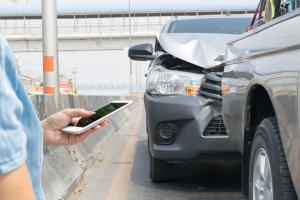
Navigating Cross-Border Accidents: Legal Steps for Louisiana Drivers Involved in Out-of-State Crashes
Cross-border accidents can involve multiple legal jurisdictions, which can complicate the process of determining liability, filing claims, and pursuing compensation. Different states have their own traffic laws, insurance requirements, and legal standards, making it essential for Louisiana drivers to be aware of what to expect and how to proceed.
Attorney William P. Morrow of the Morrow Law Firm in Opelousas, Louisiana, offers insight into the challenges that Louisiana drivers may encounter when involved in out-of-state accidents. "Accidents that occur outside of Louisiana present unique legal hurdles. Understanding the legal landscape of the state where the accident occurred is critical to ensuring that drivers' rights are protected and that they receive the compensation they are entitled to," says Morrow.
Understanding Jurisdiction in Cross-Border Accidents
One of the primary challenges in cross-border accidents is determining which state has jurisdiction over the case. Jurisdiction typically depends on where the accident occurred, meaning that the laws of the state where the accident happened will generally govern the case. This can impact everything from the process of filing a claim to the amount of compensation that may be available.
In some cases, multiple jurisdictions may be involved, especially if the accident includes parties from different states. This can lead to disputes over which state's laws should apply, particularly when it comes to issues such as fault determination and damage calculations.
Morrow explains, "When an accident occurs outside of Louisiana, the laws of that state will usually govern the legal proceedings. This can be challenging for drivers who are unfamiliar with the legal standards and procedures of the state where the accident occurred. Understanding these differences is essential for building a strong case."
Filing Insurance Claims After an Out-of-State Accident
Filing an insurance claim after an out-of-state accident can also present challenges, particularly when dealing with different insurance laws and coverage requirements. Louisiana drivers may assume that their auto insurance policy will cover them no matter where the accident occurs, but this is not always the case. Insurance companies may have different procedures for handling claims that arise from out-of-state accidents, and drivers may need to navigate additional paperwork or meet different deadlines.
In some instances, the insurance coverage that is required in one state may not be sufficient in another. For example, minimum liability coverage requirements vary from state to state, and what is adequate in Louisiana may fall short in another state. This can complicate the claims process and may leave drivers facing unexpected out-of-pocket expenses.
"Insurance policies are designed to provide coverage across state lines, but the process of filing a claim after an out-of-state accident can be more complicated than it would be for an in-state accident. It's important for drivers to review their policies and understand what is covered before they travel," Morrow advises.
Dealing with Legal Differences Between States
In addition to differences in insurance coverage, drivers may also encounter legal differences between states that can impact the outcome of their case. For example, some states have no-fault insurance laws, meaning that each driver's insurance company pays for their own damages, regardless of who is at fault. Louisiana, however, follows a fault-based system, where the party responsible for the accident is liable for damages.
These differences can create confusion for drivers who are involved in accidents outside of Louisiana, especially when it comes to determining who is responsible for paying for damages and medical expenses. Additionally, the statute of limitations—the time limit for filing a lawsuit—varies between states, and failing to meet these deadlines can result in losing the right to pursue a claim.
"Different states have different rules regarding fault, liability, and the time limits for filing claims. It's essential for Louisiana drivers to be aware of these differences when involved in an out-of-state accident. Failing to understand these laws can significantly impact the outcome of a case," Morrow cautions.
Steps to Take After an Out-of-State Accident
Louisiana drivers involved in out-of-state accidents should take several key steps to protect their rights and ensure they receive fair compensation:
Document the Scene: Take photos of the accident scene, including damage to vehicles, road conditions, and any other relevant details. This evidence can be crucial in establishing fault and supporting your claim.
Exchange Information: Gather contact and insurance information from all parties involved in the accident. Be sure to include the names, phone numbers, and addresses of any witnesses.
Report the Accident: Notify local law enforcement and file a police report. This report will be important evidence in your case and may be required by your insurance company.
Seek Medical Attention: Even if injuries seem minor, it's important to seek medical attention as soon as possible. This ensures that any injuries are properly documented, which can be important for your claim.
Contact Your Insurance Company: Report the accident to your insurance company and provide them with all relevant documentation. Be prepared to navigate additional steps or requirements for out-of-state claims.
Consult with an Attorney: Cross-border accidents can be legally complex, especially when dealing with different state laws and insurance regulations. Consulting with an attorney can help you understand your rights and the best course of action.
Conclusion
Cross-border accidents present unique legal and insurance challenges for Louisiana drivers. Understanding the differences between state laws, insurance requirements, and legal procedures is essential for navigating these complex situations. By taking the right steps and seeking appropriate legal guidance, drivers can protect their rights and pursue fair compensation, even when accidents occur outside of Louisiana.
Morgan Thomas
Rhino Digital, LLC
+1 504-875-5036
email us here
Visit us on social media:
Facebook
Distribution channels: Culture, Society & Lifestyle, Insurance Industry, Law
Legal Disclaimer:
EIN Presswire provides this news content "as is" without warranty of any kind. We do not accept any responsibility or liability for the accuracy, content, images, videos, licenses, completeness, legality, or reliability of the information contained in this article. If you have any complaints or copyright issues related to this article, kindly contact the author above.
Submit your press release

